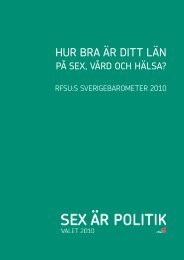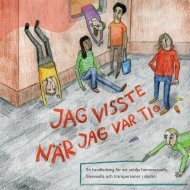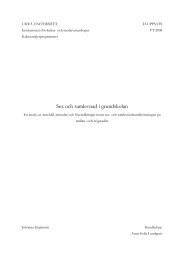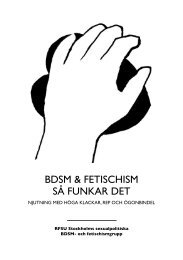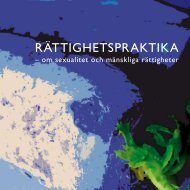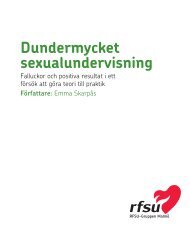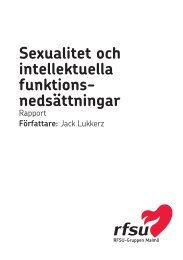Download pdf - RFSU
Download pdf - RFSU
Download pdf - RFSU
You also want an ePaper? Increase the reach of your titles
YUMPU automatically turns print PDFs into web optimized ePapers that Google loves.
PREFACE<br />
Prostitution, and the people it involves, has always been<br />
a widely debated subject. Throughout the centuries it has<br />
been the women who sell sex that have been the focus<br />
for society’s legislative actions. A positive aspect of the<br />
Swedish Prostitution Act is that role of the men involved<br />
in prostitution have been brought into focus. A thorough<br />
and scientific evaluation of the actual effects of the law<br />
is required. Is prostitution practised as extensively as in<br />
the past? We simply don’t know yet. It is also important<br />
to know if legislation has had positive effects for women<br />
involved in prostitution, and if the law has discouraged<br />
men from buying sex. Such knowledge can help us design<br />
and implement better supportive and preventive strategies.<br />
Prostitution has been analysed and defined from theoretical,<br />
political, feminist, and social perspectives. These are<br />
not mutually exclusive, but rather perspectives that can<br />
complement each other. One’s choice of measures to combat<br />
prostitution is largely dependent on one’s initial point<br />
of view. It is important to conduct an ideological debate<br />
in relation to different aspects of society. Prostitution deals<br />
with both gender and powerlessness.<br />
Questions about sexuality are, or should be, an important<br />
part of the sexual education. It is important to<br />
provide young people with educational programmes that<br />
do not condemn, but instead invite them to discuss ethical<br />
standards and values in relation to gender roles. This<br />
can also be seen as a way of combating prostitution in the<br />
long-term. The struggle against trafficking, both nationally<br />
and internationally, is equally important.<br />
We must not forget that prostitution involves individual<br />
people and their lives. That the men and women<br />
who buy or sell sex should be helped to find alternative<br />
ways of living is obvious. This can happen through<br />
psychotherapeutic treatment and psychological social<br />
support. However, the possibilities of receiving such help<br />
are minimal. Reaching the children and adolescents who<br />
are at risk for developing destructive behaviour patterns<br />
is another important aspect of prevention that requires<br />
allocation of resources. Over many decades <strong>RFSU</strong> has<br />
worked clinically with questions relating to sexuality. An<br />
important starting point has been that the work with<br />
both women and men has privided a dual perspective,<br />
and thereby a greater understanding, of the process as a<br />
whole. This report suggests that the psychological driving<br />
forces behind prostitution can be comprised of complicated<br />
patterns.<br />
The report is based on our experiences of clinical work<br />
and by no means excludes other ways of approaching or<br />
understanding prostitution. As such, the report attempts<br />
to provide a foundation for generating hypotheses about<br />
prostitution that can be used in research, as well as providing<br />
a means of stimulating the development of better<br />
methods of helping these men and women.<br />
Katarina Lindahl<br />
Secretary General, <strong>RFSU</strong><br />
1



